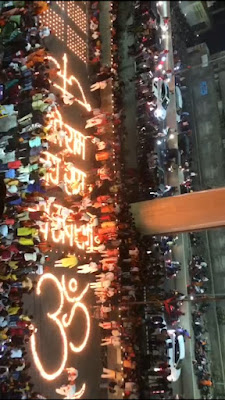Hindu New Year is full of traditions and rituals
Hindu new year
The Hindu New Year, also known as "Nav Samvatsar" or "Vikram Samvat," is a celebration steeped in tradition and ritual. The calendar reset not only marks the start of a new year, but it also represents a time of regeneration, contemplation, and spiritual rejuvenation. In this blog article, we look into the varied array of customs and activities that enrich the celebration of the Hindu New Year, highlighting their significance and relevance in modern times.
 |
The Mythological Foundation:
To grasp the core of Hindu New Year, one must go into its mythological origins. According to Hindu literature, Lord Brahma, the creator deity, created the universe at the beginning of time. The Hindu calendar dates back to the fabled age of the Mahabharata, with the crowning of King Vikramaditya signalling the start of the Vikram Samvat year. Each year in this calendar is named after a constellation, and the new year begins on Chaitra Shukla Pratipada, which occurs in March or April.
Rituals and Traditions:
1 Cleaning and Purification:
In preparation for the New Year, many houses go on a thorough cleaning spree known as "spring cleaning." This custom represents the removal of negativity and impurities, both physical and spiritual, in order to bring auspiciousness and prosperity into the home.
2 Rangoli and Decoretion:
Rangoli is an intricate pattern created at the entryway of dwellings to welcome guests and deities, inviting benefits for the following year. These bright designs, made with coloured powders or flower petals, represent unity, harmony, and the beauty of creation.
3 Offering Prayers:
Devotees visit temples or do puja (worship) at home, praying to Lord Ganesha, the remover of obstacles, and requesting blessings for a prosperous new year. Special rituals and hymns are recited, with incense sticks lit and flowers and sweets offered.
4 Feasting and Sharing:
Food is fundamental to Hindu New Year celebrations, with families gathering to share joyful meals. Traditional delicacies are cooked to represent abundance and prosperity, and they are shared with friends and neighbours as a sign of peace and harmony.
5 Seeking Astrological Guidance:
Many people visit astrologers or pundits to learn about the celestial positions and their impact on the upcoming year. Horoscopes are examined, and remedies are recommended to counteract any negative impacts and increase favourable outcomes.
6 Cultural Performances:
Throughout India, different cultural events and performances are held during the New Year celebrations, reflecting the rich tapestry of regional traditions and art forms. Dance, music, and theatrical performances allow people to express themselves culturally and build community.
Significance in Contemporary Context:
Despite its ancient origins, the Hindu New Year celebration has a significant impact on modern society. In an increasingly fast-paced society, these rituals provide opportunities for stop and reflection, encouraging a stronger connection to one's cultural background and spiritual roots. The emphasis on purification and regeneration enables people to let go of old grievances and start again, which promotes mental and emotional health.
Furthermore, the spirit of generosity and sharing that pervades the festivities promotes a sense of community and social cohesiveness. People across caste, creed, and socioeconomic level come together to celebrate, promoting the virtues of togetherness and compassion.
In an age of technological breakthroughs and globalisation, the celebration of Hindu New Year serves as a reminder of the ageless wisdom found in our ancient traditions. It encourages us to use these extensive cultural resources to negotiate the problems of modern life with grace and resilience.
Conclusion:
Hindu New Year celebrations are more than just rituals; they are a profound voyage of self-discovery and spiritual rebirth. It provides a tapestry of experiences that weaves together the fabric of community, culture, and spirituality through its diverse customs and traditions. As we commence on another year's journey, let us embrace these timeless rites with reverence and gratitude, honouring our elders' wisdom and charting a course for a future full of hope, prosperity and harmony.




Post a Comment